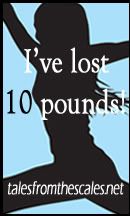When I was teaching Chem II at my last place of employment, I had one of my "teacher moments" as I was walking my students through a particular lab analysis. It was a
titration in which they had to determine the amount of vitamin C in several different kinds of juice.
I wish I could describe this particular class to you. I am not kidding when I say that almost every lesson was directed by their questions. I'd give an assignment, they'd do it - or at least attempt it - then they'd come in the next day and ask questions about whatever they didn't understand. The ability to identify what you do not understand and to formulate the appropriate question is, in my opinion, a mark of intelligence. It might be fair to say that a handful of the twenty students were asking most of the questions, but in simply addressing their questions, the entire group always seemed to stumble upon an understanding of the larger concepts. The big picture. I found that I loved this kind of student-driven learning because it seemed so much more effective than delivering a lecture that addressed what I thought was important.
They were at it again on this particular day of lab analysis. As part of their lab assignment, I asked them to make a simple statement about how the volume of the titrant was related to the amount of vitamin C in the sample. This kind of terminology was familiar to them. We'd spent considerable time the previous year studying the "relatedness" of pressure, temperature, and volume in a gas (the gas laws.)
They easily determined from their data that the titrant and vitamin C concentration were directly related. (In other words, the more titrant they had to use, the more vitamin C was in the sample.)
Then I asked them to write the mathematical formula that described the relationship between the two variables.
Panic.
"I've never heard of a formula for that?""Where do we find that formula?""No, no, no!" said I. "This formula doesn't exist. You need to figure one out!"
Jaws dropping. Brows furrowing. Eyes widening.
"How do we do that?""Well, how are they related?"
"Directly.""Then write a formula for two variables that are directly related."
"HOW?""Think about it. Have you ever heard of other variables that were directly related?"
"Yeah. What was that gas law? Was it pressure divided by temperature, or was it pressure multiplied by temperature?""I can't remember a formula from that long ago!""Then don't. Why don't you just try something and SEE IF IT ACTUALLY DESCRIBES YOUR DATA."
So they tried one. It didn't work. Then they switched it around and - IT WORKED.
"So we can just MAKE UP a formula?""Well, no. You can't just make one up out of thin air. But did you find one that describes your data?"
"Yes.""Then that's your formula."
This is where I launched into a mini lecture about how every mathematical formula in the history of mankind didn't exist until someone MADE IT UP. And why did they make it up? Because it WORKED to describe their data.
It was like little lightbulbs going off all over the room.
"OOOhhh!"-------
I love this story because it was one of few times where I think I witnessed some kids "getting it." What I hate about this story is that they were juniors and seniors in high school and they were only just coming to this realization: math is a tool.
Someone invented algebra. And trigonometry. And calculus. And differential equations. They invented them because they needed a way to describe the things they were observing in the natural world:
People made up math because it helped them describe something.
Math is never solving the quadratic equation 20 times just to see what the answer is. NO! The answer has meaning. Without meaning, there is no reason to do the math in the first place. Teaching math without meaning is one of my biggest complaints about education today. Math in most schools is taught in isolation. The answers have no meaning. This kind of approach to math education results in kids who don't know how to
use math. They don't realize they are the master of it. They think the math tells THEM what to do, when in fact real math is the exact opposite!
Most schools are turning out kids who can solve the quadratic equation when you tell them:
Solve this problem using the quadratic equation. What is the point of this? (Just out of curiosity, does anyone know someone who sits around solving quadratic equation problems just to see what the answer is? No one does this! The idea is preposterous!) The problem with this is that the natural world never tells you what math to use. It's content to sit around and do its thing. The job of describing the "thing" falls on us, and it requires that we know how to use the tool of math to make accurate description.
My desire is to approach math education a little bit more wholistically. Ms. Boo is currently working through a part of her math curriculum that covers measurement. Part of her lessons the last two days has been to identify the instrument that would be used to measure certain things. (She can chose from ruler, thermometer, measuring cup, or scale.)
So, it bugged me a bit when the book showed her a picture of a bag of flour and gave a scale and a measuring cup as choices. Another example showed a pitcher of water and gave measuring cup and ruler as options. (The implication is that only one of the choices is "correct.")
Is it totally inconceivable that someone would want to measure the weight of flour? People often do this in their own kitchens because it is more accurate than using a measuring cup. Is it unheard of to measure the height of water? Uh, rain guage, anyone?
This kind of "detached" math, where you don't have a reason for answering the question is just another example of teaching math in isolation. Instead of asking "what do I need to know about the flour to solve this problem" we are simply making an exercise of it.
Here is where I will stop, because I have no pretty ending to this rant. Ms. Boo's lessons have brought these thoughts right back to the forefront of my mind. The difference is that now I am in a position where I can do something about it.
Labels: Education, Favorite, Homeschooling, Nerdiness, Snarkilicious
 at
at 




















